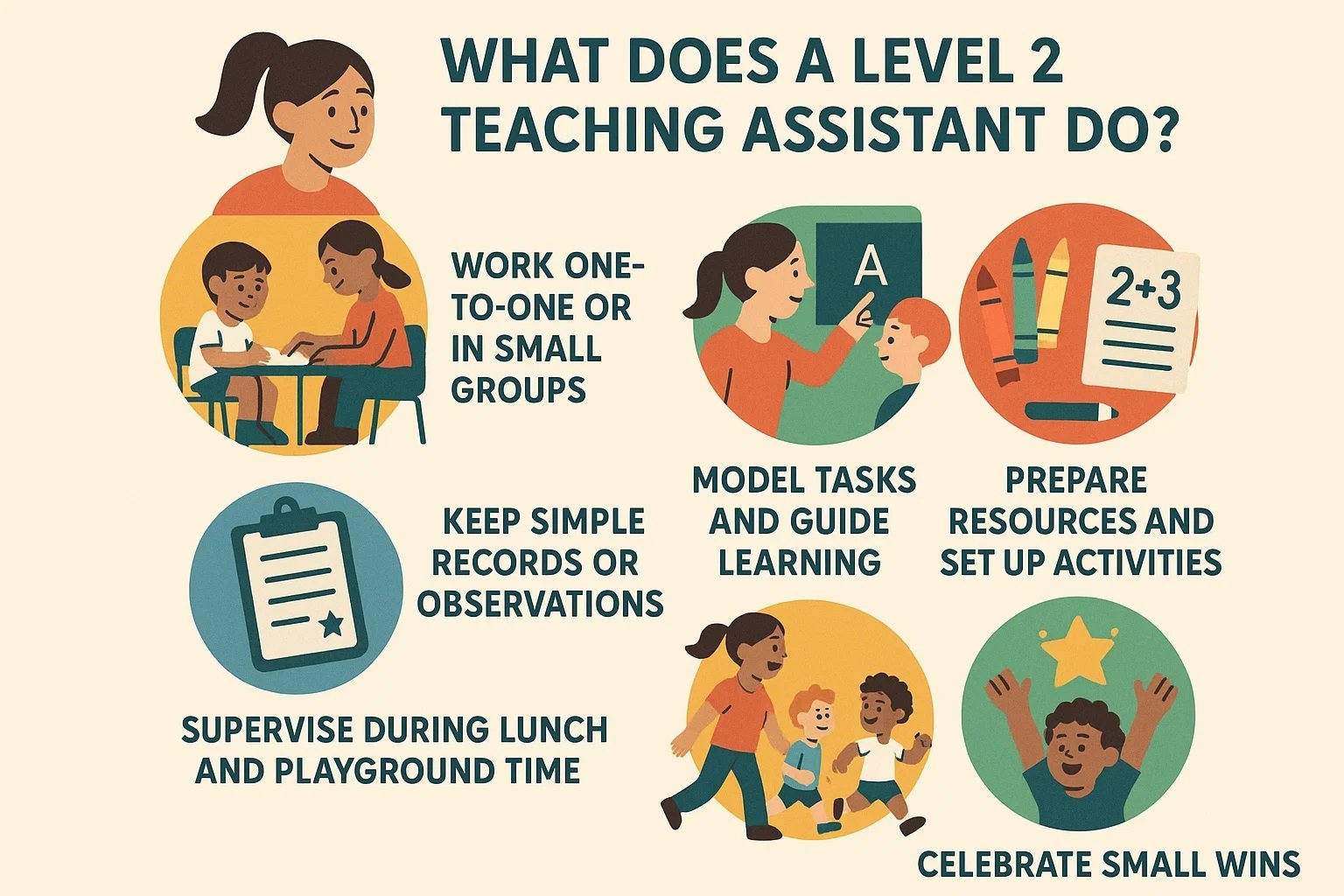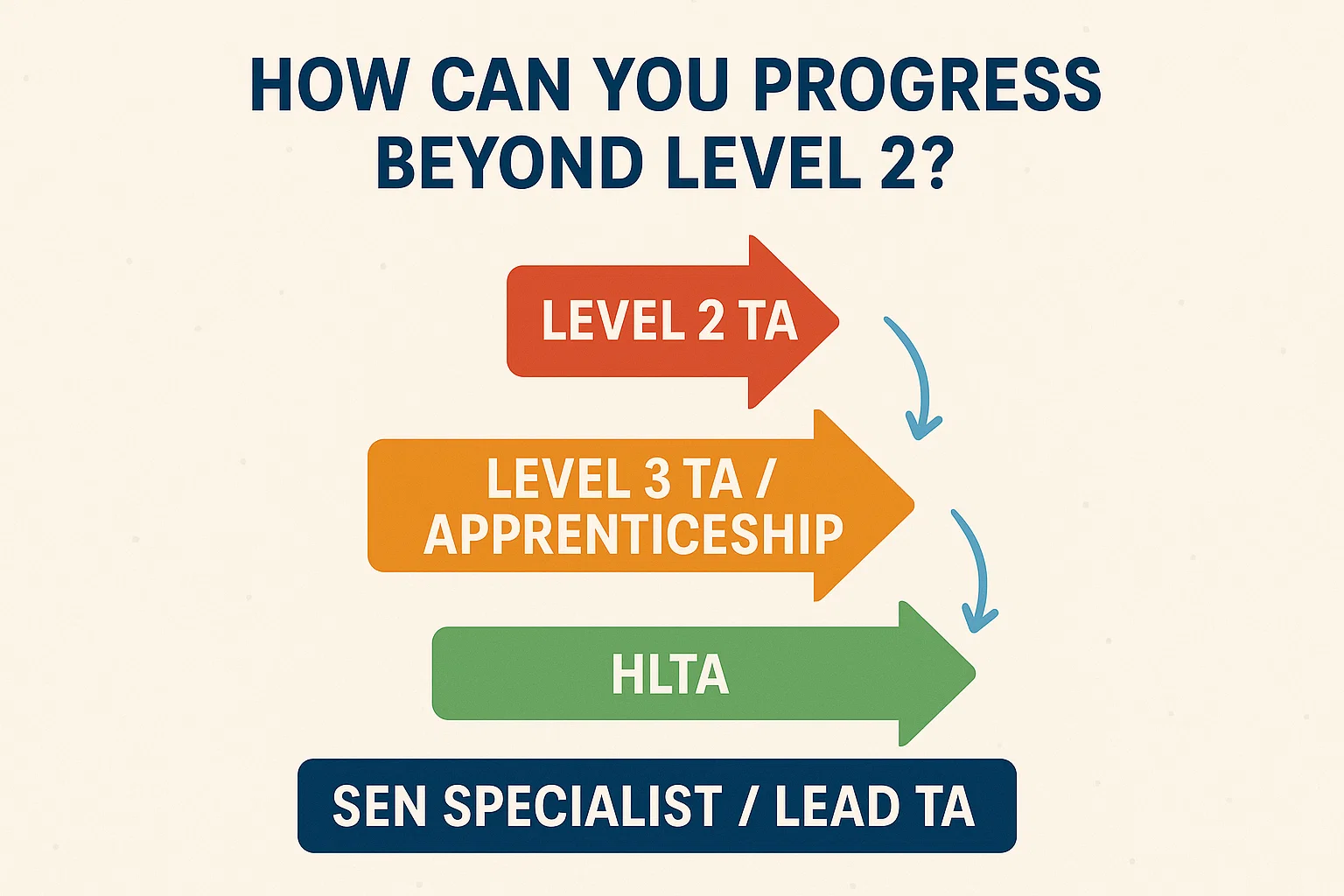No products in the cart.

The question “what is a level 2 teaching assistant” comes up often — simply put, it’s the starting role in schools that supports both teachers and learners daily. You’ll keep lessons running smoothly, help kids learn, and be an important part of the school day. In this guide, you’ll find exactly what you need and how to start in 2025.
The good news is that getting started is easy. You just need GCSE English & Maths (or Functional Skills), an enhanced DBS, and proof you can work in the UK. Most jobs follow the school calendar, so expect term-time only work.
What Is a Level 2 Teaching Assistant in the UK?
So, what does a Level 2 Teaching Assistant do in the UK? Simply put, it’s an entry-level role where you help teachers and support children in the classroom. You’ll assist pupils with learning, guide their behaviour, and make sure the day runs smoothly.
For example, schools might use different job titles — like TA or LSA — but the goal is always the same: helping children progress while following the teacher’s lead. Whether working with a small group, supporting one child, or helping the whole class, your role is all about giving that extra support. And importantly, seeing a child succeed because of your help is one of the most rewarding parts of the job.
What Does a Level 2 Teaching Assistant Do?

As a Level 2 Teaching Assistant, your job is all about supporting teachers and helping children succeed. Here’s what you’ll typically do:
- Work one-to-one or in small groups: Help children with reading, writing, or maths, giving them extra support to understand lessons.
- Model tasks and guide learning: Show children how to complete tasks and gently remind them about behaviour or classroom rules.
- Keep simple records or observations: Note progress or areas where children may need extra help, so teachers can plan better.
- Prepare resources and set up activities: Prepare worksheets, materials, or classroom areas to ensure smooth lessons.
- Supervise during lunch and playground time: Keep children safe, manage behaviour, and encourage positive interactions.
- Celebrate small wins: Be part of those moments when a child finally understands something or achieves a goal—it’s one of the most rewarding parts of the role!
What Qualifications Do You Need for a Level 2 Teaching Assistant Role?
English & Maths
Most schools ask for GCSEs at grades 9–4 (C) or Functional Skills, which are widely accepted. These show you have the basic skills to help children with learning.
Level 2 Certificate in Supporting Teaching & Learning
This common entry course gives you the practical skills you need to effectively support teachers in the classroom.
Safeguarding Knowledge
Understanding child protection and safety is very important. Even if it’s not always required before hiring, it helps schools trust that you can support children safely.
Complete our Level 2 Safeguarding Children Training to show employers you’re prepared to keep pupils safe and meet Ofsted expectations.
Paediatric First Aid (for EYFS Roles)
If you want to work with younger children, having Paediatric First Aid is helpful. It’s not always mandatory, but a bonus when applying for Early Years roles.
Stand out to nurseries and schools with our Paediatric First Aid course, approved for Early Years Foundation Stage requirements.
Tip: These qualifications show schools you’re ready to support children safely and confidently.
How Much Do Level 2 Teaching Assistants Earn in 2025?

Here’s a clear picture if you’re curious about how much a Level 2 Teaching Assistant earns. Most TAs are paid using the local government NJC pay scales. After the 3.2% pay rise from April 2025, a typical full-time starter earns about £24,413 a year, which is roughly £12.70 per hour for a 37-hour week.
However, most TA jobs are term-time only, which means your pay is calculated over the weeks you actually work, not the full year. For example, if you work 30 hours a week for 39 weeks, your take-home would be around £14,850 before tax, usually spread over 12 months.
Also, if you’re in London, pay can vary depending on the council. Inner or Outer London weightings often increase the hourly rate above the national figure. So, it’s a good idea to check your council’s 2025/26 NJC pay table for the exact numbers.
In short, the pay is fair for the hours you work, and seeing the difference it makes to children’s learning can make every hour feel really rewarding.
Curious about Teaching Assistant pay? Read our full blog “How Much a Teaching Assistant Earns in the UK” for a clear guide on salaries in different areas.
What Skills Do You Need to Be a Level 2 Teaching Assistant?
Being a Level 2 Teaching Assistant isn’t just about qualifications—it’s also about the right skills and mindset. Here’s what really helps you succeed:
Patience
Working with children of all abilities means staying calm, repeating instructions when needed, and giving them time to learn at their own pace. This patience helps you support every child without feeling rushed.
Empathy
Understanding each child’s feelings and needs allows you to connect with them. By showing kindness and noticing when a child is struggling, you can boost their confidence and make learning easier.
Clear Communication
Being able to explain tasks simply, ask questions clearly, and listen carefully helps children understand and follow instructions. In addition, good communication keeps teachers informed about progress or challenges.
Teamwork
You’ll work closely with teachers, other TAs and school staff. Also, being reliable, cooperative, and willing to pitch in ensures the classroom runs smoothly and creates a positive learning environment.
Organisation and Time Management
Keeping lessons running smoothly, managing tasks, and preparing resources on time helps both you and the teacher. Moreover, good organisation gives children a structured, calm learning space.
Basic ICT Skills
Using classroom technology like tablets, interactive whiteboards, or simple data systems is often part of the role. Additionally, being comfortable with basic ICT makes tasks like recording observations easier and more accurate.
Safeguarding Mindset
Always think about child safety, confidentiality, and reporting concerns. Finally, knowing how to protect children and follow school policies builds trust with both children and staff.
Do You Need Experience to Become a Level 2 Teaching Assistant?
No experience? No problem! Schools often welcome newcomers to Level 2 positions or Level 3 apprenticeships, so you can grow your skills while earning money. Even so, showing enthusiasm and a willingness to learn goes a long way.
At the same time, it’s helpful to have some evidence that you can work with children. You can quickly build this by:
- Volunteering in a classroom: Spending a few hours helping out shows you understand how a classroom works and that you can support children.
- Joining reading groups or after-school clubs: Supporting small groups demonstrates your ability to guide and encourage learning.
- Gaining experience in nurseries or Early Years settings: Working with younger children is valuable and often looked upon favorably.
- Tutoring children: Even informal tutoring proves you can explain concepts clearly and support learning effectively.
In short, schools value your attitude, reliability, and practical skills more than years of experience. By taking small steps and building evidence, you can confidently land your first Level 2 role.
What Is the Difference Between Level 2 and Level 3 TAs?

Level 2 Teaching Assistant
Level 2 is the first step into classroom support. You work closely with the teacher, helping with small groups, one-to-one support or everyday classroom tasks. Basically, you’re there to make sure lessons run smoothly and children get the help they need.
Level 3 Teaching Assistant
Level 3 gives you more freedom and responsibility. You might run small interventions, support children with special educational needs (SEN), and take on tasks more independently. Plus, Level 3 roles usually come with higher pay, reflecting the extra responsibilities.
In short, Level 2 is great for getting started and learning the ropes, while Level 3 is the next step if you want more independence, responsibility, and better pay.
How Can You Progress Beyond Level 2?
Level 2 TA → Level 3 TA / Apprenticeship → HLTA → SEN Specialist / Lead TA
Moving on from a Level 2 Teaching Assistant is easier than you might think. The first step is usually a Level 3 role or apprenticeship, where you can earn while you learn. Here, you’ll take on more responsibility and start working more independently in the classroom, which feels both exciting and rewarding.
Next, you can aim for HLTA (Higher Level Teaching Assistant) status, which gives you more recognition and responsibility. At the same time, completing extra training in areas like autism, ADHD, behaviour management, or communication can help you progress faster.
Once you’ve built experience and confidence, you can step into specialist roles such as SEN Specialist or Lead TA, supporting other TAs and running targeted interventions in the classroom.
With experience, training, and dedication, this path helps you grow step by step and build a fulfilling career making a real difference to children’s learning every day.
Do Level 2 Teaching Assistants Work Term-Time Only?
Yes, most Level 2 Teaching Assistant roles are term-time only, which usually means around 38–40 weeks a year. Even so, your hourly rate stays the same, but your annual pay is calculated only for the weeks you actually work.
This means your monthly pay might look smaller compared to full-year jobs, but it matches the hours and weeks you’re contracted for. Essentially, you’re paid fairly for the work you do, just spread over the school year.
Can a Level 2 Teaching Assistant Become a Teacher?
Absolutely! Starting as a Level 2 Teaching Assistant gives you hands-on classroom experience. You’ll help children learn, see how lessons are run, and understand how schools work. Next, you can move up to a Level 3 TA role or HLTA, taking on more responsibility, running small-group support, and helping with lessons while building the skills teachers need.
After that, your experience makes it easier to train as a teacher. You can take routes like QTS, PGCE, or school-based apprenticeships, which teach you how to plan lessons, manage a class, and lead learning independently.
FAQs
- What is the difference between TA 2 and TA 3?
Level 2 TAs provide entry-level classroom support under a teacher’s guidance. Level 3 TAs have more independence, can run small-group interventions, often support SEN pupils, and are paid more.
- What is the role of a Level 2 teaching assistant?
They support learning, help with behaviour, assist in lessons, work with small groups or 1:1, and help prepare resources under the teacher’s direction.
- Can a Level 2 TA cover a class?
No, Level 2 TAs always work under a teacher’s supervision and cannot lead a class alone.
- What does a Level 2 TA get paid?
Most follow the NJC pay scales. In 2025, full-time starters earn around £24,413/year (~£12.70/hour); term-time roles are pro-rata.
- Can a TA teach a class alone?
No. Only qualified teachers or sometimes HLTA-level staff can lead a class independently.
Final Thoughts: Is a Level 2 Teaching Assistant the Right Step for You?
If you’ve been wondering what is a Level 2 Teaching Assistant and whether it’s right for you, here’s the truth — it’s a great first step if you enjoy helping children learn and want to grow in education. This role lets you be part of the classroom every day, earn while gaining experience, and work your way up to Level 3, HLTA, or even teaching in the future.
Before you get started, take a quick look at your council’s 2025/26 NJC pay table to see what you could earn. And don’t forget to start your Enhanced DBS check early (£49.50, with a £16 yearly update service) so you’re ready when the right job comes along.
Ready to jump in? Take your first step today — enrol in the Teaching Assistant Course at Open Learning Academy and start building a rewarding classroom career where you truly make a difference!




